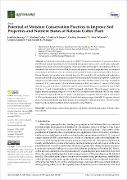| dc.contributor.author | Judith, Kobusinge | |
| dc.contributor.author | Geofrey, Gabiri | |
| dc.contributor.author | Godfrey H., Kagezi | |
| dc.contributor.author | Godfrey, Sseremba | |
| dc.contributor.author | Alice, Nakitende | |
| dc.contributor.author | Geofrey, Arinaitwe | |
| dc.contributor.author | Charles K., Twesigye | |
| dc.date.accessioned | 2023-05-23T07:36:29Z | |
| dc.date.available | 2023-05-23T07:36:29Z | |
| dc.date.issued | 2023-04 | |
| dc.identifier.citation | Kobusinge, J., Gabiri, G., Kagezi, G. H., Sseremba, G., Nakitende, A., Arinaitwe, G., & Twesigye, C. K. (2023). Potential of Moisture Conservation Practices to Improve Soil Properties and Nutrient Status of Robusta Coffee Plant. Agronomy, 13(4), 1148. | en_US |
| dc.identifier.uri | https://doi.org/10.3390/ | |
| dc.identifier.uri | https://hdl.handle.net/20.500.12504/1350 | |
| dc.description.abstract | Soil moisture conservation practices (SMCPs) have been adopted in Uganda to adapt to
the effects of climate variability. However, limited information exists on how conservation measures
influence the physico-chemical properties of soil and coffee leaf nutrient concentrations. Thus, we
determined the effects of selected SMCPs on the soil physio-chemical properties and leaf nutrient
concentrations in Robusta coffee in a randomized incomplete block design, replicated three times, in
Kituza, Uganda. Soil samples were collected from 0 to 20 cm and 20 to 40 cm depths, and analyzed in
the laboratory following standard procedures for selected physio-chemical properties. Coffee leaf
samples were picked from each treatment (open sun coffee (COSS), coffee cover crop, Desmodium
intortum (CCS), coffee mulch, Miscanthidium violoceum (CMS), and coffee A. coriaria (ACS)). Bulk
density was significantly (p < 0.001) the highest under ACS (1.61 gcm−3) and lowest under CCS
(1.29 gcm−3), and it significantly (p < 0.001) increased with depth. The soil organic matter was
higher than the optimum range of 1–3% at the 0–20 cm depth across different SMCPs, but within
the optimum range at the 20–40 cm depth. Leaf nitrogen was significantly the highest under ACS
(3.19%) and lowest under COSS (2.30%). Overall, the findings suggest that SMCPs improve the soil
physio-chemical attributes and leaf nutrients for sustainable coffee productivity. However, ACS
improved the leaf plant nutrition better compared to other SMCPs. | en_US |
| dc.language.iso | en | en_US |
| dc.publisher | Agronomy | en_US |
| dc.subject | Soil moisture conservation practices | en_US |
| dc.subject | Soil physio-chemical properties | en_US |
| dc.subject | Robusta coffee leaf nutrient | en_US |
| dc.title | Potential of moisture conservation practices to improve soil properties and nutrient status of Robusta coffee plant | en_US |
| dc.type | Article | en_US |

